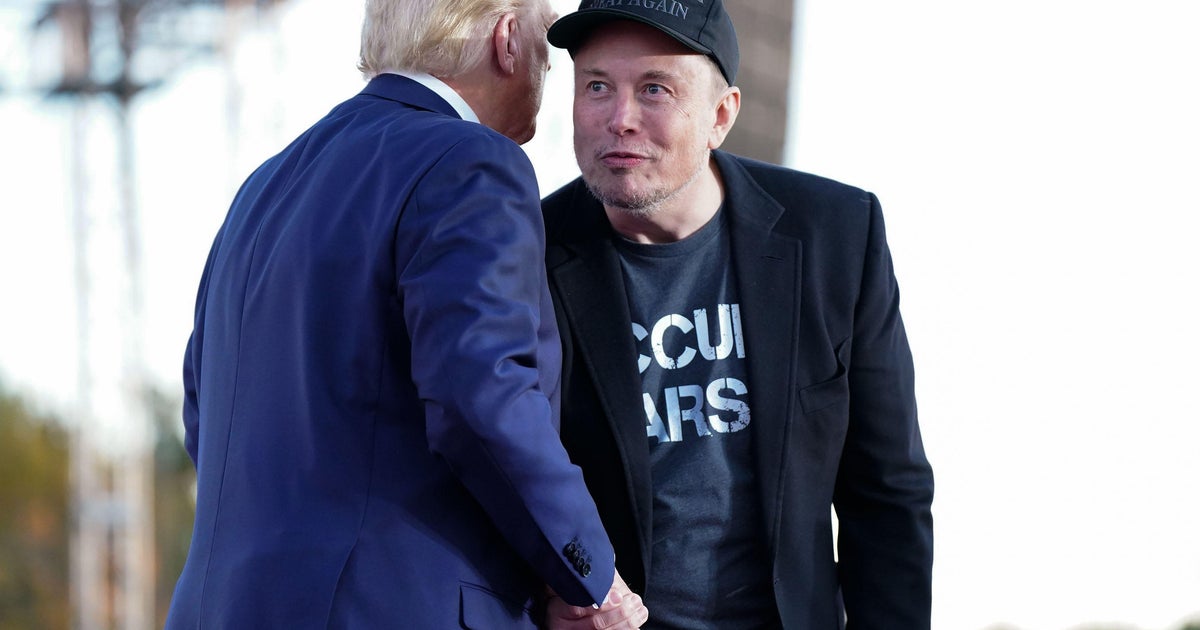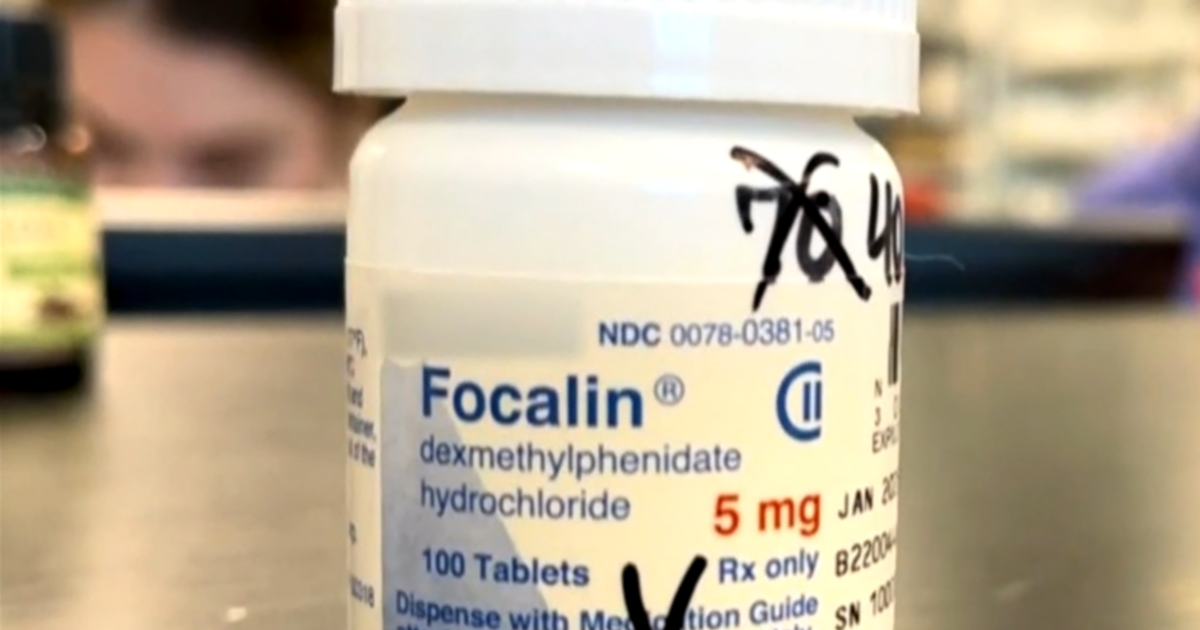CBS News
25% of adults think they have undiagnosed ADHD, survey shows. A doctor shares what to know.

ADHD, or attention deficit hyperactivity disorder, could be more common in adults than we realize.
The Centers for Disease Control and Prevention estimates that about 15.5 million U.S. adults have received a diagnosis of ADHD at some point in their life. But according to a new survey from The Ohio State University Wexner Medical Center and College of Medicine, about 25% of American adults suspect they have undiagnosed ADHD, and only about 13% have shared their suspicions with their doctors.
Mental health experts worry that self-diagnosis can lead to the wrong treatment.
If someone suspects they have ADHD, they should definitely see a doctor, Dr. Céline Gounder, CBS News medical contributor and editor-at-large for public health at KFF Health News, said on “CBS Mornings” Tuesday.
“The symptoms of ADHD can be more subtle in an adult. There’s a lot of overlap with other mental health as well as other medical conditions, and how you treat it may be different depending on what mix of symptoms, what other overlapping syndromes you might have,” she said.
What is ADHD?
ADHD is a neurodevelopmental disorder characterized by issues with inattention, restlessness, hyperactivity and impulsivity, Gounder explained.
The CDC describes it as “a common childhood disorder that can continue into adulthood,” but notes there is “limited information about diagnosis and treatment in adults.”
“The reason there’s a lot of stigma around this is we tend, as a society in general, to blame the symptoms of many medical issues, from obesity to addiction, on character flaws and are missing the point that this is actually a real medical condition,” she said.
ADHD in adults
While it’s more likely that ADHD develops in childhood and may have gone under the radar, there are some people who do seem to develop some of these symptoms later in life, according to Gounder.
“With adults, we’re more mature, we’re better able to mask some of the symptoms and cope with some of the symptoms. And so it may be not as obvious in an adult,” she said.
Gounder said signs that may point to ADHD in adults include:
- Difficulty finishing projects or focusing on tasks
- Difficulty with organizational skills and time management
- Being fidgety, feeling restless
- Interrupting others, talking excessively
The Mayo Clinic also notes people may also experience impulsive decision-making, irritability and difficulty managing emotions or frustration.
“Those are some of the behaviors that we see. But again, there’s a lot of overlap with other things, so you really do need somebody who knows how to diagnose this,” Gounder said.
ADHD treatment
Treatment of ADHD typically includes a combination of therapy and medication.
CBT, or cognitive behavioral therapy, teaches you how thoughts, feelings and behaviors interact and “how to, in a sense, override what might be your initial impulse in a certain situation,” Gounder explained.
Medications may include stimulants like Adderall, Vyvanse, Ritalin or Concerta.
“There are also some medications that are not stimulants, they just take a little longer to kick in,” she said.
CBS News
What Trump’s Cabinet picks reveal about his governing priorities

Watch CBS News
Be the first to know
Get browser notifications for breaking news, live events, and exclusive reporting.
CBS News
Trump’s win could sharply raise the cost of electric vehicles. Here’s why.

With President-elect Donald Trump vowing to pull the plug on the $7,500 tax credit for buyers of electric vehicles, one EV maker and its billionaire owner are fully behind the idea and even stand to profit from it.
“Take away the subsidies, it will only help Tesla,” Tesla owner Elon Musk posted in July on X, the social media platform he owns.
The credit granted to buyers of EVs helped make the case for buying the climate-friendlier vehicles, and when an earlier version of the tax credit was done away with several years ago, Tesla cut prices on its cars by about half of the credit its buyers were no longer receiving.
Tesla is the sole automaker to be generating a profit on its U.S. sales. Manufacturing EVs is a losing proposition for Big Three vehicle makers like Ford and General Motors, who sell a fraction of EVs compared with Tesla.
Once the EV tax credit is vanquished, the price of EVs overall might drop, cutting into Tesla’s profits, as opposed to increasing the company’s red ink as it could for legacy automakers still working to get a firmer footing in the EV market. Should traditional automakers scale back on their EV production and sales to curtail the losses, EV shoppers would have even fewer options, benefiting Tesla.
As Musk touted his support for axing the EV tax credit, Tesla’s auto industry rivals signaled the opposite.
The Alliance for Automotive Innovation urged that the tax credit continue, telling lawmakers in an October letter that U.S. manufacturers count on it as they vie with Chinese EV production. Around the world, vehicle makers have poured billions into transitioning to electric cars.
Further, the Zero Emission Transportation Association on Friday called on Trump to reconsider, saying the tax credit has bolstered employment in states that voted Republican, including Ohio, Kentucky, Michigan and Georgia.
“If the United States is going to continue to fight to bring those jobs here and actually compete to win against China, there needs to be a demand signal — like the New Clean Vehicle Tax Credit — aligned with that goal, otherwise we would be undercutting those investments and hurting American job growth,” ZETA Executive Director Albert Gore stated on Friday.
“The potential elimination of the federal tax credit for electric vehicles by the Trump administration — without another form of incentive to replace it — could derail the trajectory of EV sales in the United States,” offered Edmunds analysts.
Trump repeatedly vowed to eliminate what he labeled President Joe Biden’s “EV mandate” as he campaigned for the White House.
While there is no such mandate in federal law, the Inflation Reduction Act passed during President Biden’s term revived the credit for many EV purchases, while also granting low interest loans to manufacturers constructing EV and battery plants.
Trump’s transition team intends to knock out the credit as part of a broader tax-reform measure, according to a Thursday report by Reuters, which cited two sources with direct knowledge of the matter.
The president-elect during his first term attempted to repeal the EV tax credit, which was expanded by President Biden in 2022.
Analysts who track Tesla concurred with Musk’s view that the credit’s demise would only help his company.
“This is a clear negative for the EV industry at first look and would particularly hurt GM, Ford, Stellantis and Rivian,” wrote Wedbush Securities tech analyst Daniel Ives. Conversely, “this will enable Tesla to further fend off competition from Detroit as pricing/scale/scope is an apples-to-oranges when compared to the rest of the auto industry once the EV tax credit disappears.”
Americans looking to buy an electric car should do so sooner rather than later, advised Ivan Drury, Edmunds’ director Insights.
“The federal tax credit combined with slashed prices due to slowed sales momentum has contributed to electric vehicles becoming labeled as some of the best deals on the market in 2024. Now, with production cuts shrinking supply and a fresh wave of demand from those seeking a deal while they still can, it can be all but assured that the price for that EV you’ve been eyeing is going up in the coming months,” Drury stated.
CBS News
Trump win could sharply raise the cost of electric vehicles. Here’s why.

With President-elect Donald Trump vowing to pull the plug on the $7,500 tax credit for buyers of electric vehicles, one EV maker and its billionaire owner are fully behind the idea and even stand to profit from it.
“Take away the subsidies, it will only help Tesla,” Tesla owner Elon Musk posted in July on X, the social media platform he owns.
The credit granted to buyers of EVs helped make the case for buying the climate-friendlier vehicles, and when an earlier version of the tax credit was done away with several years ago, Tesla cut prices on its cars by about half of the credit its buyers were no longer receiving.
Tesla is the sole automaker to be generating a profit on its U.S. sales. Manufacturing EVs is a losing proposition for Big Three vehicle makers like Ford and General Motors, who sell a fraction of EVs compared with Tesla.
Once the EV tax credit is vanquished, the price of EVs overall might drop, cutting into Tesla’s profits, as opposed to increasing the company’s red ink as it could for legacy automakers still working to get a firmer footing in the EV market. Should traditional automakers scale back on their EV production and sales to curtail the losses, EV shoppers would have even fewer options, benefiting Tesla.
As Musk touted his support for axing the EV tax credit, Tesla’s auto industry rivals signaled the opposite.
The Alliance for Automotive Innovation urged that the tax credit continue, telling lawmakers in an October letter that U.S. manufacturers count on it as they vie with Chinese EV production. Around the world, vehicle makers have poured billions into transitioning to electric cars.
Further, the Zero Emission Transportation Association on Friday called on Trump to reconsider, saying the tax credit has bolstered employment in states that voted Republican, including Ohio, Kentucky, Michigan and Georgia.
“If the United States is going to continue to fight to bring those jobs here and actually compete to win against China, there needs to be a demand signal — like the New Clean Vehicle Tax Credit — aligned with that goal, otherwise we would be undercutting those investments and hurting American job growth,” ZETA Executive Director Albert Gore stated on Friday.
“The potential elimination of the federal tax credit for electric vehicles by the Trump administration — without another form of incentive to replace it — could derail the trajectory of EV sales in the United States,” offered Edmunds analysts.
Trump repeatedly vowed to eliminate what he labeled President Joe Biden’s “EV mandate” as he campaigned for the White House.
While there is no such mandate in federal law, the Inflation Reduction Act passed during President Biden’s term revived the credit for many EV purchases, while also granting low interest loans to manufacturers constructing EV and battery plants.
Trump’s transition team intends to knock out the credit as part of a broader tax-reform measure, according to a Thursday report by Reuters, which cited two sources with direct knowledge of the matter.
The president-elect during his first term attempted to repeal the EV tax credit, which was expanded by President Biden in 2022.
Analysts who track Tesla concurred with Musk’s view that the credit’s demise would only help his company.
“This is a clear negative for the EV industry at first look and would particularly hurt GM, Ford, Stellantis and Rivian,” wrote Wedbush Securities tech analyst Daniel Ives. Conversely, “this will enable Tesla to further fend off competition from Detroit as pricing/scale/scope is an apples-to-oranges when compared to the rest of the auto industry once the EV tax credit disappears.”
Americans looking to buy an electric car should do so sooner rather than later, advised Ivan Drury, Edmunds’ director Insights.
“The federal tax credit combined with slashed prices due to slowed sales momentum has contributed to electric vehicles becoming labeled as some of the best deals on the market in 2024. Now, with production cuts shrinking supply and a fresh wave of demand from those seeking a deal while they still can, it can be all but assured that the price for that EV you’ve been eyeing is going up in the coming months,” Drury stated.








